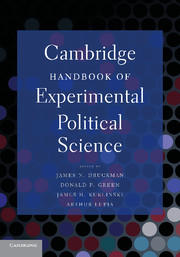
An Experimental Approach to Citizen Deliberation
Type
Deliberation has become, in the words of one scholar, “the most active area of political theory in its entirety” (Dryzek 2007, 237). Our exploration of the relationship between experiments and deliberation thus begins with normative theory as its starting point. Experiments can yield unique insights into the conditions under which the expectations of deliberative theorists are likely to be approximated, as well as the conditions under which theorists' expectations fall short. Done well, experiments demand an increased level of conceptual precision from researchers of all kinds who are interested in deliberative outcomes. However, perhaps most important, experiments can shed greater scholarly light on the complex and sometimes conflicting mechanisms that may drive the outcomes of various deliberative processes. In other words, experiments allow researchers to better understand the extent to which, the ways in which, and under what circumstances it is actually deliberation that drives the outcomes deliberative theorists expect.
Co-winner of the Robert E. Lane Award for the best book published in political psychology in 2011, awarded by the APSA Political Psychology Section, and of the Best Book Award for best book published in 2011 that either uses or is about experimental research methods in the study of politics, awarded by the APSA Experimental Research Section
